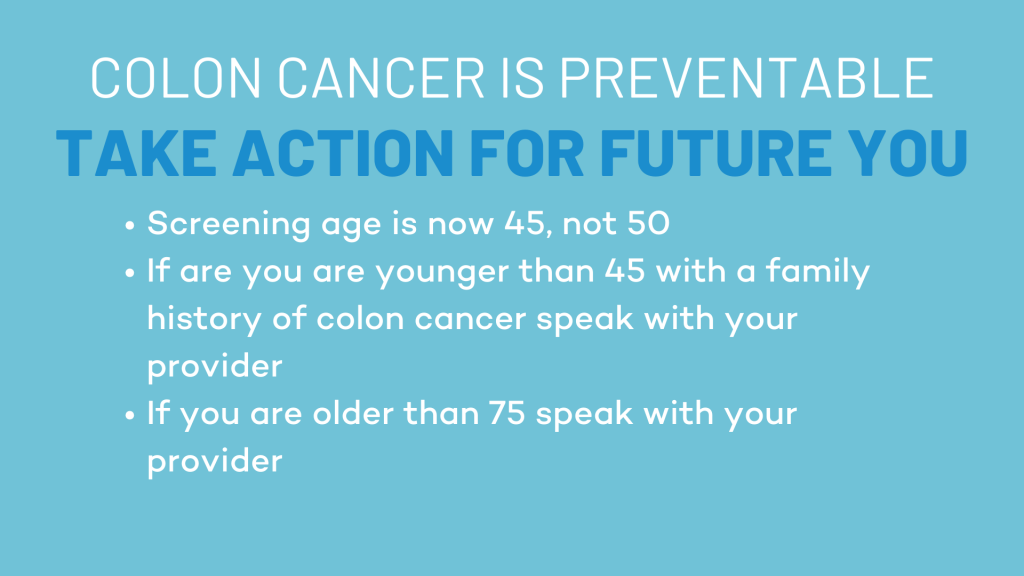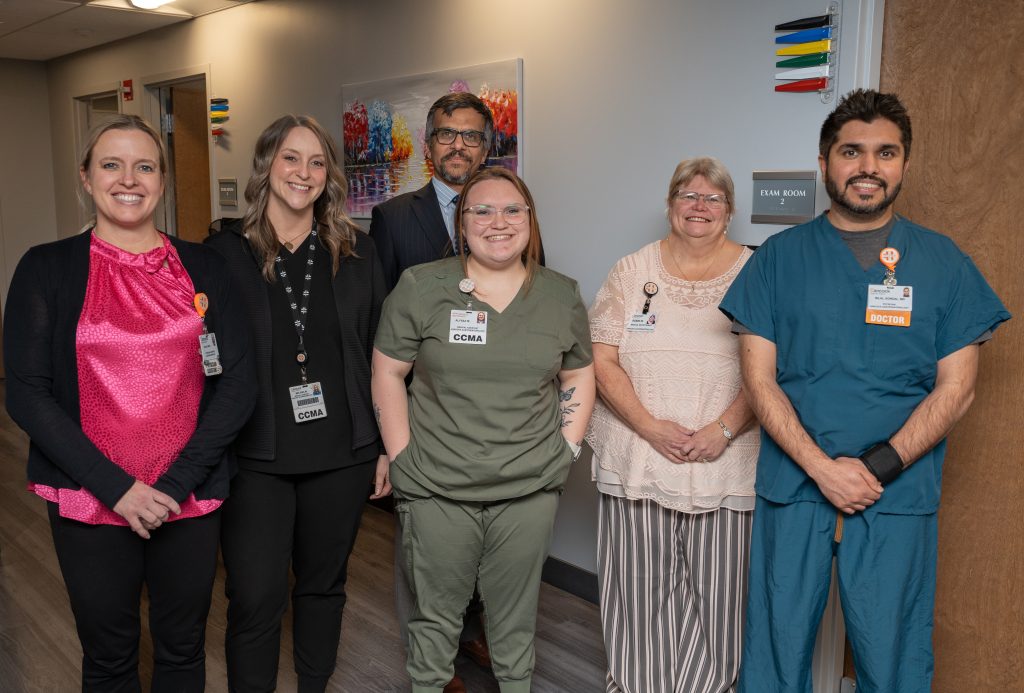

March is colorectal cancer (colon cancer) awareness month. There are numerous reasons why talking with your healthcare provider about colon cancer is important.
- Colon cancer the third most common cancer among men and women.
- It also happens to be the third most common cause of cancer deaths in men and fourth in women.
- Combined in both men and women it is the second most common cause of cancer deaths in United States.
Preventative Screenings Are Crucial & Lifesaving
Colon cancer is a silent threat. It often develops without noticeable symptoms in its early stages, earning it the moniker of a “silent killer.” By the time symptoms like changes in bowel habits, blood in stool, abdominal discomfort, or unexplained weight loss appear, the cancer may have already advanced to a more dangerous stage. This underscores the necessity of proactive measures to catch it early. But it’s not all bad news.
When it comes to colon cancer there is good news. The number of people diagnosed with colon cancer since the mid-80s is decreasing, thanks to more awareness towards preventative screening, more sensitive screening tests, and people living healthier lifestyles.
However, as we are getting smarter so is colon cancer. Plus, it’s getting more and more common in younger individuals. In people younger than 55, colon cancer rates have been increasing by 1% to 2% a year since the mid-1990s. According to a new American Cancer Society (ACS) study, the number of people under 55 diagnosed with colorectal cancer has nearly doubled since 1995 despite this age group shrinking in the overall population by more than 10%.
Is Colon Cancer Preventable?
Yes, early screening is the key. Colonoscopy reduces colon cancer incidence by about 40% and risk of dying from it by about 60%. Because colon cancer is getting more and more common in young adults, ACS and US Preventive Task Force has decreased the age of screening for colon cancer from 50 to age 45.
45 may sound young for a colonoscopy and we often have patients ask, “Do you really find polyps in people as young as 45 compared to my parents who had polyps, but they are in their 60s? I am totally fit. I don’t even take any medication. Perfect health!”
Let’s Review the Stats
According to one study people in age group of 45 to 49 who got the colonoscopy had the same chance of precancerous polyps detection as the people in age group of 50-54 who underwent colonoscopy (4).
Moreover, according to another study, if people in the age group of 45 to 49 get their colonoscopy there is a chance of preventing 72 cases of colon cancer per 100k people in US population (5). It means 72 more individuals under age 50 can live to be colon cancer free if they were screened for colon cancer.
According to another study, screening for colon cancer in folks in the age group 45–49 reduced the risk of colon cancer by 50% compared with no screening. Essentially you are twice less likely to be diagnosed with colon cancer if you start the screening for colon cancer from age 45.
Are there any symptoms of colon cancer?
Yes, colon cancer can cause symptoms, but in its early stage there often no noticeable symptoms. Do not wait for symptoms, get screening on time.
Some of the common symptoms of colon cancer are:
- Noticing change in your bowel habit
- A feeling that you need to have a bowel movement that’s not relieved by having one
- Rectal bleeding with bright red blood
- Blood in the stool, which might make the stool look dark brown or black
- Cramping or abdominal pain
- Weakness and fatigue
- Being anemic on routine blood test
Know Your Colon Cancer Risk Factors
Certain factors may increase your risk of developing colon cancer, including age, family history, a personal history of colorectal polyps or inflammatory bowel disease, a sedentary lifestyle, obesity, smoking, and heavy alcohol consumption. Understanding your risk factors can empower you to make informed decisions about when and how often to undergo screening.
What can I do to decrease my chances of colon cancer?
- Cut back on alcohol consumption
- Quit smoking
- Consume less red meat and eat healthy including veggies
- Avoid processed meat
- Regularly exercise
Encouraging Your Loved Ones to Get Screened
Despite its importance, colon cancer screening is often avoided due to fear, discomfort, or embarrassment. However, it’s crucial to break through these barriers and prioritize one’s health.
Screening procedures are generally safe, and healthcare providers strive to ensure patient comfort throughout the process. Remember, a moment of discomfort during screening is a small price to pay for the potential to prevent or detect a life-threatening disease.
Encourage loved ones to learn about the different types of screening tests that check for colorectal cancer and decide which test they might prefer. Validate how they feel and offer support to drive them to and from their screening. Talking about it can help remove worries or stigma, too. It also can also help uncover any family history.
What are the ways to screen for colon cancer?
Methods of screening include a stool test or a colonoscopy. Both are good at screening for a polyp (which is a pre-cancerous growth) and detecting cancer. The advantage of colonoscopy is that it can detect a polyp and remove the polyp at the same time.
Don’t let fear stand in the way of your well-being. A few minutes of a safe test can save your life and let you live a healthier cancer-free life with your loved ones.
Schedule your colon cancer screening today – for future you. Your life may depend on it.
Ready to act?
Hancock Gastroenterology is urging East Central Indiana and surrounding residents age 45+ to get their colon cancer screening. Don’t wait until symptoms appear or it’s too late. Take control of your health by discussing colon cancer screening with your healthcare provider today. Together, you can develop a screening plan tailored to your individual risk factors and preferences. By prioritizing prevention and early detection, you can significantly reduce your risk of falling victim to this preventable disease.

To schedule a screening or for more information, call the Hancock Gastroenterology clinic at 317-477-6360 or speak with your healthcare provider.

Sources
- Nishihara R, Wu K, Lochhead P, et al. Long-term colorectal-cancer incidence and mortality after lower endoscopy. N Engl J Med. 2013; 369(12): 1095-1105. doi:10.1056/nejmoa1301969
- Doubeni CA, Corley DA, Quinn VP, et al. Effectiveness of screening colonoscopy in reducing the risk of death from right and left colon cancer: a large community-based study. Gut. 2018; 67(2): 291-298. doi:10.1136/gutjnl-2016-312712
- Zauber AG, Winawer SJ, O’Brien MJ, et al. Colonoscopic polypectomy and long-term prevention of colorectal-cancer deaths. N Engl J Med. 2012; 366(8): 687-696. doi:10.1056/nejmoa1100370
- Ladabaum U, Shepard J, Mannalithara A. Adenoma and sessile serrated lesion detection rates at screening colonoscopy for ages 45-49 years vs. older ages since the introduction of new colorectal cancer screening guidelines. Clin Gastroenterol Hepatol. 2022; 20(12): 2895-2904.e94. doi:10.1016/j.cgh.2022.04.037
- Ma W, Wang M, Wang K, et al. Age at initiation of lower gastrointestinal endoscopy and colorectal cancer risk among US women. JAMA Oncol. 2022; 8(7): 986-993. doi:10.1001/jamaoncol.2022.0883
- Sehgal M, Ladabaum U, Mithal A, Singh H, Desai M, Singh G. Colorectal cancer incidence after colonoscopy at ages 45-49 or 50-54 years. Gastroenterology. 2021; 160(6): 2018-2028.e13. doi:10.1053/j.gastro.2021.02.015
Relevant Services
Women's Health
Explore our women's health offerings, including OB/GYN and pelvic health, maternity, and breast health.
Gastroenterology & Hepatology
Good digestive health is essential to a healthy life. Explore our gastroenterology and hepatology services.
Cancer Care
Learn about our nationally accredited cancer care with advanced screenings and treatments.